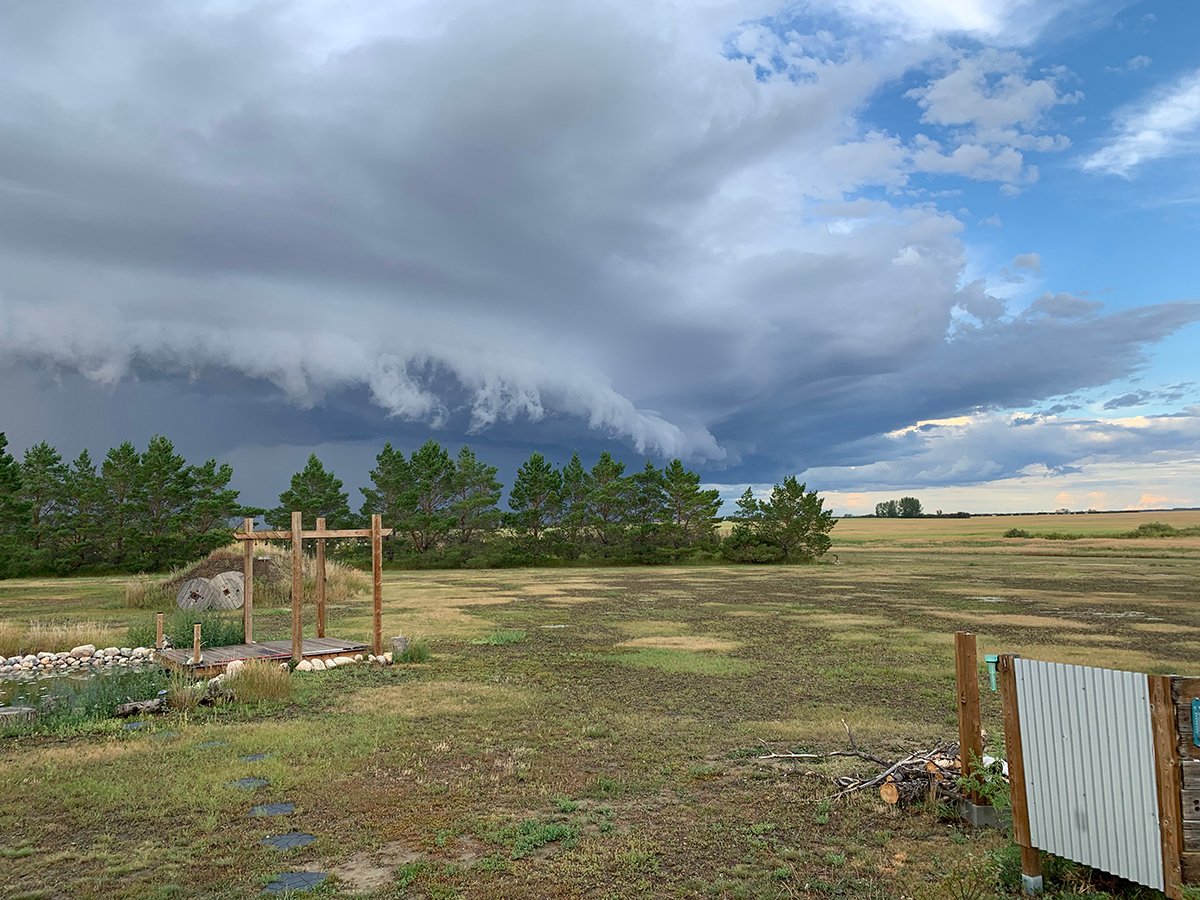ROSENORT, Man.- In 1968, Dave Waldner moved off the Hutterite colony where he grew up, leaving with his wife and eight children, two brothers, a Grade 6 education and $75.
They lived in a three-room schoolhouse and pooled their money for three years, with the men earning $1.50 an hour at a chicken farm.
They then bought separate family homes and built an 80-sow, farrow-to-finish barn in 1972.
“When you grow up that way, you don’t strike out on your own right away,” Waldner said.
“We didn’t know much of business. All of it was done for us.”
Read Also

Storm dynamics and extreme rainfall
Besides moisture, instability and orographic lift, the next biggest factor that contributes to heavy or extreme rainfall is storm dynamics.
They did know how to work hard and had plenty of experience raising chickens at the colony.
Today, Waldner, two sons and a brother run Sun Valley Farm’s 450-sow, farrow-to-finish operation near Rosenort, Man. Waldner is also vice-president of Manitoba Pork Marketing Inc. and a director with Dynamic Pork.
No one is more surprised at his transformation than Waldner himself, sitting in his hog barn’s wood paneled office surrounded by a fax, cell phone and computer.
“From what I was, I am a different man today,” said Waldner, whose voice is clearly used to shouting over the squeals of pigs.
He pointed to his election as councillor for the Rural Municipality of Morris as a turning point.
“Before, I couldn’t speak in public, and never much mixed with people.”
The 65-year-old grandfather to 21 children admitted that time has mellowed him.
“I work with my opinion now,” he said.
“Once I voiced my opinion. Now I sit back and listen more.”
He has invested in a corporate hog barn, but still believes the family farm remains the most efficient way to raise a pig.
He praised programs like the Net Income Stabilization Account, which allows the family to put aside government-matched money for when they need it and replenish it in good times.
“I think all the money should go into one program instead of five different programs. That way we all get it.”
Waldner said he brings a common sense approach to meetings.
“I always try to do what’s good for the people,” he said.
“I come to these meetings not as a professional, but I view everything from the common sense approach.”
Gerry Friesen, president of Manitoba Pork Marketing Inc., said Waldner is dedicated to serving hog producers.
“He’s very willing to share his opinions with regards to the grassroots producers, whether it favours producers or not,” said Friesen, who previously served with Waldner on Manitoba Pork est.
The co-operative’s mandate is to address marketing issues, but Waldner’s concerns are much broader, said Friesen, noting Waldner’s “passion” for the environment and safety net programs like Agricultural Income Disaster Assistance.
“We need more people like him who make time to devote themselves to the hog industry,” he said.
Improving operation
Waldner has taken a keen interest in research and has experimented with aeration and feed enzymes to minimize manure odour. He has also developed his own mineral and vitamin pre-mix for his animals.
Sun Valley helped test a quality assurance program pilot project, has teamed with university researchers on various projects, provided job shadowing opportunities for students and hosted tours.
In recognition of his farm’s high standards in modern pork production, Waldner received the swine steward award from the Manitoba Pork Council this year.
“Whatever I learned about pigs, I learned myself going to meetings and talking to people,” he said.
On the family farm, Waldner handles grain buying and bookkeeping, Joe runs breeder barns, Dave Jr. runs the farrowing unit and Waldner’s brother Danny runs the finisher barn.
Waldner said the families left the Plum Coulee colony to pursue an independent life, where they could speak freely and do things their own way.
“Freedom is worth a lot and you don’t realize it until it is taken away from you,” he said.
They faced many struggles in navigating the farm through tough financial times in the 1980s and through two major floods.
In 1997, they kept 4,000 pigs safe in the barn by adding a 1.2 metre high temporary dike around a barn, already sitting 2.7 m higher than the surrounding flood plain.
“Through our struggles, we have always been sensitive to people less fortunate than we are,” said Waldner, an active member of Rosenort’s evangelical Mennonite church.
His oldest son works with street people in Colombia. Waldner has donated pigs to the Harvest food program in Winnipeg and to the Mennonite Central Committee, and supports Restoration House, which aids underprivileged children.
“I don’t like to do nothing small. When I do it, I do it kind of big,” said a smiling Waldner.
Reflecting on his life, Waldner expressed regrets over leaving family behind in the colony. But he believes God guided him to Rosenort, to hog farming and to help others.
“If God gives me my health, I intend to keep going,” he said.
“I like it very much to have the freedom of what I do.”














